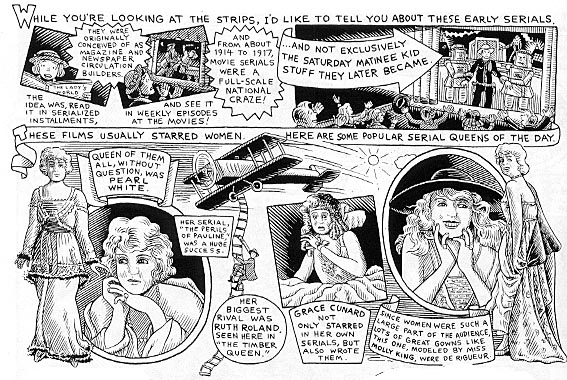 By Kim Deitch
By Kim Deitch
136 pages, black and white
Published by Pantheon Books
I’m not entirely sure why I hadn’t read anything by Kim Deitch up until now. Maybe it was a bad first impression, glancing at his scratchy, slightly blocky art and not giving it a chance. Maybe it was just a lack of finding a book that seemed to instantly appeal. Whatever the reason, it wasn’t until Alias the Cat showed up that I sat down and gave Deitch’s comics the respect they deserved. Collecting Deitch’s The Stuff of Dreams mini-series, it’s a remarkably clever piece of metafiction that blurs the lines of reality and make-believe in a way that works far better than any description could even begin to try and tackle.
Kim Deitch and his wife Pam Butler were on another flea market trip when they found it—a stuffed cat toy that Pam wanted to add to her collection. When the vendor refused to sell it, telling a fantastic story involving shipwrecks, a remote desert island, and a cult worshiping a strange talking cat named Waldo, Kim and Pam weren’t sure if they entirely believed it. Unfortunately for them, their curiousity was piqued just enough. From there, they are to discover a mystery stretching back over the years connected to movies, kidnappings, newspaper comic strips, a town populated by midgets and dwarfs, and mental institutions. And really, that’s just the tip of the iceberg with the strangeness to come.
 Alias the Cat is definitely one of the stronger pieces of metafiction that I’ve seen in comics. Initially presented as a straight autobiography, it begins to come clear in a matter of pages that Deitch’s story is fictional even as it continues to present itself to the reader in a way that refuses to admit its origins. It’s a sharp methodology, especially in its original serialized format—the first issue ends with a plea from Kim and Pam for readers to please send them any stuffed Waldo toys that they can find, and the second issue begins with the “results” from those requests. Later on, a “letter” written after the second issue was published (and printed in the third and final issue) provides the lead that Kim needs to bring him further in his quest to find out the truth about Waldo. From fake newspaper strips to a transcription of old reel-to-reel tapes, Deitch uses several different formats and techniques to tell Alias the Cat and what could have come across as pretentious is instead thoughtful and fun. Maybe’s the initial laid back narration that gradually grows increasingly frantic, but Deitch is able to build up a real sense of caring for and about his alter-ego Kim that everything just falls into place.
Alias the Cat is definitely one of the stronger pieces of metafiction that I’ve seen in comics. Initially presented as a straight autobiography, it begins to come clear in a matter of pages that Deitch’s story is fictional even as it continues to present itself to the reader in a way that refuses to admit its origins. It’s a sharp methodology, especially in its original serialized format—the first issue ends with a plea from Kim and Pam for readers to please send them any stuffed Waldo toys that they can find, and the second issue begins with the “results” from those requests. Later on, a “letter” written after the second issue was published (and printed in the third and final issue) provides the lead that Kim needs to bring him further in his quest to find out the truth about Waldo. From fake newspaper strips to a transcription of old reel-to-reel tapes, Deitch uses several different formats and techniques to tell Alias the Cat and what could have come across as pretentious is instead thoughtful and fun. Maybe’s the initial laid back narration that gradually grows increasingly frantic, but Deitch is able to build up a real sense of caring for and about his alter-ego Kim that everything just falls into place.
The story itself, all metafictional techniques aside, is also a lot of fun. In some ways it’s a rambling epic, starting off small and then quietly growing in size and scope until by the end of the story it’s taken on a life of its own. Deitch’s imagination runs rampant here, with strange tattoos and cults being one of the more normal events of Alias the Cat. Perhaps the most impressive part of the graphic novel, though, is when Kim is discovering the “Alias the Cat” movie and comic strips that seem to be detailing real-life events, only to later get the real story on what happened. What could have been intensely boring to hear many of the same story elements a second time as the truth is revealed is instead still gripping to the reader, Deitch bringing in a real sense of urgency and tension to its retelling. Throughout the entire book, my only complaint in the entire part of its writing is the occasional misspelled word; it happens just often enough that it’s a little surprising that at some point in the publishing or collecting process that these weren’t corrected.

Deitch’s art took me a little bit to get into. It’s not bad by any stretch of the imagination, but it’s a very simplistic, almost blocky style. Deitch has a real penchant for using diagonal lines to shade his art, although much to my surprise it’s the sort of thing that seems to become more and more welcoming as the book progresses, rather than growing old. On the other hand, Deitch seems to have a limited run of facial expressions for his characters; “Kim surprised” in particular looks so much from one page to the next that if you didn’t know better you’d think it was the same piece of art being copied into each panel. Deitch’s biggest strength in his art definitely comes from when he’s depicting art from earlier times; there, from drawing the star of “The Perils of Pauline” to aping a fake newspaper strip, he’s able to mimic those earlier times in such a way that you feel like you’re getting an actual glimpse into those times.
Bizarrely surrealistic and fun, Alias the Cat is a strong enough book that I’ve already made plans to read Deitch’s back catalog. If you’ve never read anything by Deitch before, this is a great place to begin. By the time you’re done, if you’re like me you’ll be wondering why it took you so long to check out Deitch’s works. Highly recommended.
Purchase Links:
